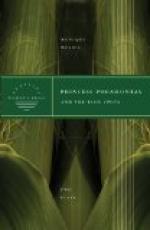[Illustration: VIRGINIA IN 1606—FROM CAPTAIN JOHN SMITH’S MAP]
“The sailors of Captain Newport,” he explained, “are staying here too long and are devouring much of the supplies designed for us. A strange mania hath overtaken them, little Sister; they are mad for gold. They believe that the streams about here are full of the dust they and our men of Jamestown value more than life itself. It is more to them than thy precious pocone, and as thou seest, they desert their ship and spend their days sifting sand. If they are not soon gone there will be nothing left for the mouths of any of us.”
“Thou shalt not want, Brother,” promised Pocahontas, and the next day came the Indians with large stores of provisions. These Smith now bought from them with beads and utensils and colored cloths. But the President and the Council, jealous of the growing importance of Smith’s relations with the savages, sought to increase their own by paying four times the amount Smith had agreed upon.
Discouragement met Smith with each morning’s sun and kept him awake at night. The colony seemed to take no root in this virgin soil; men who would not work in the fields to raise grain toiled feverishly in search of gold, forgetting that a full harvest would mean more for their welfare than bags of money. Then, to add to the troubles, a fire started one winter night at Jamestown and spread rapidly over most of the town, burning down the warehouse in which the precious grain was stored. From cold and starvation “more than halfe of us dyed,” wrote Smith later in his history.
Both with his own strength and by his example John Smith strove to his utmost to rebuild Jamestown and to encourage the downhearted and to make friends for himself among those who had listened to suspicions of his purposes.
For a long time Powhatan had desired to secure weapons such as the white men used, but the colonists had so far refused the Indians’ request to barter them. Now he determined to try other methods. He sent twenty fat turkeys—each a heavy burden for the man who bore it across his shoulders—to Captain Newport, asking that in return the Englishman would send him twenty swords. Newport, whose orders from the authorities in London had been not to offend the natives in any manner, had not refused and had sent the swords in return. Then Powhatan, still eager to secure a further store of weapons, had twenty more fine turkeys carried to Smith, asking for twenty swords more. But Smith, who had been taught by experience and insight many things about the relations which should prevail between the colony and the Indians, knew how unwise it was to give to an untried friend the means of turning against the giver. He knew that the Indians respected his sternness with them more than they did the evident desire of Newport and the Council to please them. Therefore he refused. The disappointed savages showed their anger and cried out insolent words against Smith.




